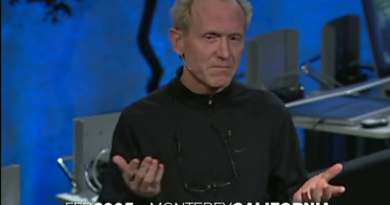Photo by Marc-Olivier Jodoin on Unsplash
Seu inimigo mortal capturou você e o conectou a um experimento bizarro. Ele estendeu seu sistema nervoso com um neurônio muito longo para um alvo a cerca de 70 metros de distância. Em algum momento, ele vai disparar uma flecha. Se você puder pensar no alvo antes que a flecha o atinja, você estará livre. Então, quem ganha essa corrida? Seena Mathew examina a velocidade do pensamento. (Fonte: TED.COM)
| Audio | |
|---|---|
Normal | Slow |
| English Transcript | Tradução |
| Your mortal enemy has captured you and hooked you up to a bizarre experiment. | Seu inimigo mortal capturou e aprisionou você em um experimento bizarro. |
| He's extended your nervous system with one very long neuron to a target about 70 meters away. | Ele conectou seu sistema nervoso com um neurônio muito longo a um alvo a 70 metros de distância. |
| At some point, he's going to fire an arrow. | Em algum momento, ele vai disparar uma flecha. |
| If you can then think a thought to the target before the arrow hits it, he'll let you go. | Se você conseguir ter um pensamento em relação ao alvo antes que a flecha o atinja, ele deixará você partir. |
| So who wins that race? | Então, quem vence a corrida? |
| In order to answer, we have to examine the hardware of thought: neurons. | Para responder, temos que examinar os componentes do pensamento: os neurônios. |
| The human brain has about 86 billion of these cells. | O cérebro humano tem cerca de 86 bilhões dessas células. |
| They transmit signals down their axons by way of electrical impulses, or action potentials. | Elas transmitem sinais por seus axônios por meio de impulsos elétricos ou potenciais de ação. |
| One neuron can then pass that signal to the next at a synapse by way of chemical neurotransmitters. | Um neurônio pode então transmitir o sinal à próxima sinapse por meio de neurotransmissores químicos. |
| The signal is received by the next neuron's dendrites, propagated down its axon, and passed further along. | O sinal é recebido pelos dendritos do neurônio seguinte, propagado por seu axônio e passado adiante. |
| So, the key factors that determine how quickly you think include how long it takes to generate an initial action potential; propagate it down the length of the axon; and transport it through the synapse. | Então, os fatores determinantes da velocidade do pensamento incluem quanto tempo se leva para criar um potencial de ação inicial, propagá-lo ao longo do axônio e transportá-lo pela sinapse. |
| We must also factor in the number of neurons involved and the distance the signal has to travel. | Devemos também considerar o número de neurônios envolvidos e a distância que o sinal precisa percorrer. |
| Let's see what this looks like in a simple pathway: your knee-jerk reflex. | Vejamos como funciona em um simples caminho: o reflexo patelar. |
| A strike to your patellar tendon triggers an electrical impulse that travels up a sensory neuron to your spine. | Uma batida no tendão patelar provoca um impulso elétrico que percorre um neurônio sensorial até a medula espinhal. |
| There the signal branches, and for the sake of simplicity, we'll consider the segment that jumps into a motor neuron to journey back down your leg. | O sinal se ramifica e, para simplificar, consideraremos o segmento que salta para um neurônio motor e retorna para a sua perna. |
| The total length of the neurons in that pathway is about 1 meter in someone who is 5 foot 5 inches, and on average it takes 15 to 30 milliseconds from strike to kick. | O comprimento total dos neurônios nesse caminho é de cerca de 1 metro em uma pessoa de 1,65 m, e leva em média de 15 a 30 milissegundos da batida no joelho à resposta. |
| Speed is distance divided by time, so this signal travels somewhere between 120 to 240 kilometers per hour. | A velocidade é a distância dividida pelo tempo, então o sinal viaja entre 120 e 240 km/h. |
| The initial action potential accounts for 1 to 5 milliseconds and synaptic transmissions only take .1 to .5 milliseconds, so the bulk of that time is spent within the axons. | O potencial de ação inicial representa de 1 a 5 milissegundos, e a transmissão sináptica leva apenas de 0,1 a 0,5 milissegundos, então, a maior parte do tempo é gasta dentro dos axônios. |
| This is consistent with research findings that the average individual neuron sends signals at around 180 kilometers per hour. | Isso condiz com descobertas científicas, segundo as quais um único neurônio envia sinais a 180 km/h em média. |
| But speeds can be boosted with myelination and increased axon diameter. | Mas pode-se aumentar a velocidade com a mielinização e o aumento do diâmetro dos axônios. |
| Myelin is a fatty sheath that insulates an axon, preventing electrical currents from leaking out. | A mielina é uma capa de tecido adiposo que isola um axônio, evitando a fuga de correntes elétricas. |
| Meanwhile, axons with larger diameters offer less internal resistance. | Enquanto isso, os axônios de diâmetros maiores oferecem menos resistência interna. |
| These compounded factors can raise the speed of an action potential as high as 432 kilometers per hour. | Esse conjunto de fatores pode aumentar um potencial de ação em até 432 km/h. |
| There's plenty of variation: some people think faster than others, and your own speed of thought changes throughout your lifetime. | Há muitas variações: algumas pessoas pensam mais rápido que outras e a velocidade do nosso pensamento pode mudar ao longo da vida. |
| In particular, as you reach old age, the myelin sheath covering your axons wears down, and other neuronal structures degrade. | Especificamente, quando envelhecemos, a bainha de mielina que cobre os axônios se desgasta, e outras estruturas neuronais se degradam. |
| Back to the dastardly experiment. | Voltemos ao vil experimento. |
| Arrows shot from recurve bows fly, on average, around 240 kilometers per hour. | Em média, flechas disparadas de arco recurvo viajam a cerca de 240 km por hora. |
| Which means that given a sufficiently long, myelinated or large-diameter neuron, your thoughts actually could win the race. | Isso significa que, com um neurônio bem longo, mielinizado ou de grande diâmetro, seus pensamentos poderiam vencer a corrida. |
| But there's a wrinkle. | Mas... há um porém. |
| The arrow and thought don't leave the gate at the same time; first the arrow fires, then once you perceive it, your signal can start down its path. | A flecha e o pensamento não partem ao mesmo tempo; primeiramente, a flecha é disparada e, quando você a percebe, seu sinal pode começar a percorrer o caminho. |
| Processing images or music, participating in inner speech, and recalling memories all require complicated neural pathways that are nowhere close to the linearity of the knee-jerk reflex. | Processar imagem ou música, participar de um diálogo e lembrar-se de memórias requerem caminhos neurais complicados, muito além da linearidade do reflexo patelar. |
| The speed at which these thoughts occur is mostly consistent, with variations based on myelination and axon diameter. | A velocidade dos pensamentos é consistente, na maioria das vezes, com variações baseadas na mielinização e no diâmetro dos axônios. |
| But the duration of a thought will vary significantly depending on its routes, pitstops, and destination. | Mas a duração de um pensamento poderá variar de modo significativo segundo os trajetos, paradas e destino. |
| In this case, when you perceive a threatening stimulus, you'll invoke a fear startle response. | Nesse caso, quando percebemos o estímulo de uma ameaça, invocamos uma resposta de sobressalto de medo. |
| Similar to the knee-jerk response, a startle can be involuntary and quite fast. | Semelhante ao reflexo patelar, um sobressalto pode ser involuntário e bem rápido. |
| If the string twangs loud enough, you might react in less than 65 milliseconds. | Se o barulho da corda for muito alto, talvez você consiga reagir em menos de 65 milissegundos. |
| More likely though, your startle reaction will be based on sight. | Mas é mais provável que a sua resposta de sobressalto se baseie no que você vê. |
| Our eyes can process an image as quickly as 13 milliseconds, but computation of what you're seeing and determining the danger it poses can take as long as 180 to 200 milliseconds. | Nossos olhos podem processar uma imagem em 13 milissegundos, mas o cálculo do que você vê e a análise do perigo potencial podem levar de 180 a 200 milissegundos. |
| In that time the arrow will have gained a head start of about 13 meters. | Nesse tempo, a flecha terá conseguido a vantagem de cerca de 13 metros. |
| The target is far enough away that you've got just enough of a chance to catch up, if you can quickly, and quite literally, think your way out. | O alvo está longe o bastante para que você tenha uma chance de alcançá-lo se você conseguir rapidamente, e literalmente, se livrar dessa. |
Contagem de palavras
A tabela abaixo exibe as palavras encontradas neste vídeo, bem como o número de vezes em que aparecem.
Veja também: Para que serve esta tabela?
| Freq. | Palavra | Freq. | Palavra | Freq. | Palavra |
|---|---|---|---|---|---|
| 40 | the | 22 | to | 17 | of |
| 17 | and | 17 | a | 13 | your |
| 13 | that | 10 | you | 10 | in |
| 9 | is | 9 | can | 7 | it |
| 7 | as | 6 | signal | 6 | neuron |
| 6 | milliseconds | 6 | down | 6 | an |
| 5 | with | 5 | thought | 5 | on |
| 5 | axon | 5 | at | 5 | arrow |
| 4 | time | 4 | this | 4 | think |
| 4 | speed | 4 | so | 4 | per |
| 4 | long | 4 | kilometers | 4 | hour |
| 4 | by | 4 | but | 4 | axons |
| 4 | action | 4 | about | 3 | will |
| 3 | way | 3 | up | 3 | these |
| 3 | then | 3 | target | 3 | startle |
| 3 | quickly | 3 | potential | 3 | or |
| 3 | neurons | 3 | knee | 3 | jerk |
| 3 | its | 3 | if | 3 | has |
| 3 | from | 3 | enough | 3 | electrical |
| 3 | diameter | 3 | be | 3 | average |
| 2 | who | 2 | which | 2 | what |
| 2 | we | 2 | travels | 2 | thoughts |
| 2 | there's | 2 | than | 2 | takes |
| 2 | take | 2 | synapse | 2 | strike |
| 2 | start | 2 | some | 2 | signals |
| 2 | sheath | 2 | response | 2 | reflex |
| 2 | race | 2 | quite | 2 | perceive |
| 2 | pathway | 2 | out | 2 | one |
| 2 | next | 2 | myelination | 2 | myelin |
| 2 | meters | 2 | less | 2 | length |
| 2 | initial | 2 | how | 2 | he's |
| 2 | have | 2 | for | 2 | factors |
| 2 | experiment | 2 | distance | 2 | consistent |
| 2 | based | 2 | back | 2 | away |
| 2 | around | 1 | you've | 1 | you're |
| 1 | you'll | 1 | wrinkle | 1 | within |
| 1 | wins | 1 | win | 1 | when |
| 1 | we'll | 1 | wears | 1 | very |
| 1 | vary | 1 | variations | 1 | variation |
| 1 | twangs | 1 | triggers | 1 | travel |
| 1 | transport | 1 | transmit | 1 | transmissions |
| 1 | total | 1 | throughout | 1 | through |
| 1 | threatening | 1 | though | 1 | they |
| 1 | there | 1 | their | 1 | tendon |
| 1 | system | 1 | synaptic | 1 | sufficiently |
| 1 | structures | 1 | string | 1 | stimulus |
| 1 | spine | 1 | spent | 1 | speeds |
| 1 | speech | 1 | somewhere | 1 | someone |
| 1 | simplicity | 1 | simple | 1 | similar |
| 1 | significantly | 1 | sight | 1 | shot |
| 1 | sensory | 1 | sends | 1 | segment |
| 1 | seeing | 1 | see | 1 | same |
| 1 | sake | 1 | routes | 1 | resistance |
| 1 | research | 1 | require | 1 | recurve |
| 1 | received | 1 | recalling | 1 | reaction |
| 1 | react | 1 | reach | 1 | raise |
| 1 | propagated | 1 | propagate | 1 | processing |
| 1 | process | 1 | preventing | 1 | potentials |
| 1 | poses | 1 | point | 1 | plenty |
| 1 | pitstops | 1 | people | 1 | pathways |
| 1 | path | 1 | patellar | 1 | passed |
| 1 | pass | 1 | particular | 1 | participating |
| 1 | own | 1 | our | 1 | others |
| 1 | other | 1 | order | 1 | only |
| 1 | once | 1 | old | 1 | offer |
| 1 | occur | 1 | number | 1 | nowhere |
| 1 | neurotransmitters | 1 | neuron's | 1 | neuronal |
| 1 | neural | 1 | nervous | 1 | myelinated |
| 1 | must | 1 | music | 1 | motor |
| 1 | mostly | 1 | mortal | 1 | more |
| 1 | might | 1 | meter | 1 | memories |
| 1 | meanwhile | 1 | means | 1 | loud |
| 1 | looks | 1 | literally | 1 | linearity |
| 1 | likely | 1 | like | 1 | lifetime |
| 1 | let's | 1 | let | 1 | leg |
| 1 | leave | 1 | leaking | 1 | larger |
| 1 | large | 1 | kick | 1 | key |
| 1 | just | 1 | jumps | 1 | journey |
| 1 | involved | 1 | involuntary | 1 | invoke |
| 1 | into | 1 | internal | 1 | insulates |
| 1 | inner | 1 | individual | 1 | increased |
| 1 | include | 1 | inches | 1 | impulses |
| 1 | impulse | 1 | images | 1 | image |
| 1 | human | 1 | hooked | 1 | hits |
| 1 | high | 1 | he'll | 1 | head |
| 1 | hardware | 1 | got | 1 | going |
| 1 | go | 1 | given | 1 | generate |
| 1 | gate | 1 | gained | 1 | further |
| 1 | foot | 1 | fly | 1 | first |
| 1 | fires | 1 | fire | 1 | findings |
| 1 | fear | 1 | fatty | 1 | faster |
| 1 | fast | 1 | far | 1 | factor |
| 1 | eyes | 1 | extended | 1 | examine |
| 1 | enemy | 1 | duration | 1 | don't |
| 1 | divided | 1 | diameters | 1 | determining |
| 1 | determine | 1 | destination | 1 | depending |
| 1 | dendrites | 1 | degrade | 1 | dastardly |
| 1 | danger | 1 | currents | 1 | covering |
| 1 | could | 1 | consider | 1 | computation |
| 1 | compounded | 1 | complicated | 1 | close |
| 1 | chemical | 1 | changes | 1 | chance |
| 1 | cells | 1 | catch | 1 | case |
| 1 | captured | 1 | bulk | 1 | branches |
| 1 | brain | 1 | bows | 1 | boosted |
| 1 | bizarre | 1 | billion | 1 | between |
| 1 | before | 1 | arrows | 1 | are |
| 1 | answer | 1 | also | 1 | along |
| 1 | all | 1 | age | 1 | actually |
| 1 | accounts |










